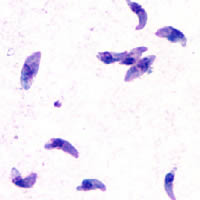 Since their domestication in ancient Egypt, cats have carved their own niche within our society; controlling pests and delighting owners worldwide. Whether our own, or our neighbours pets; the vast majority of western inhabitants interact either directly or indirectly with cats on a daily basis. Therefore, there is little wonder that at times we share more than just our living space with these animals.
Since their domestication in ancient Egypt, cats have carved their own niche within our society; controlling pests and delighting owners worldwide. Whether our own, or our neighbours pets; the vast majority of western inhabitants interact either directly or indirectly with cats on a daily basis. Therefore, there is little wonder that at times we share more than just our living space with these animals.

Toxoplasma gondii is a single celled parasite whose life cycle is intimately connected with the cat. Indeed, this parasite is entirely dependent upon conditions within its feline hosts for sexual reproduction! Despite its dependence on cats for the sexual stage of its life cycle, T.gondii is capable of infecting all mammals…including humans. The parasite can be transmitted from cats to other mammals through ingestion of T.gondii eggs. An infected cat will shed up to 20 million eggs in one leaving, with eggs surviving in the soil for over a year. Transmission occurs when the eggs are ingested by mammals feeding around the infected area. The most common form of transmission to humans is either through unwashed vegetables or undercooked meat.
When ingested by anything other than a cat the parasite reproduces asexually, forming small thin walled structures called cysts which lay dormant in many cells, most notably those of the brain. Although the dormant parasites can remain in this state for the entire life span of their accidental host, they cannot reproduce sexually until they return to their primary host (the cat). Therefore, ideally the parasite must find a way back to the cat!

Scientists researching the effect T.gondii has on wild and laboratory rodents have recently uncovered the unsettling means by which this parasite ensures itself a safe return back to its primary host. The parasite has been found to manipulate the rodents behaviour patterns, making them significantly more likely to be caught and eaten by cats. Infected rats were found to be more active and less intimidated by open spaces than non-infected animals, making them easy prey for a hunting cat. However, probably the most unusual finding was that infected rats, unlike their non-infected counterparts, were not scared of the smell of cat urine; actually spending more time in the area of their enclosure treated with this odour. This is particularly unusual since all uninfected rats, even those who have never encountered a cat, show a strong innate fear of this smell.
The mind control adopted by these parasites is probably linked to the presence of cysts within the hosts brain cells. Scientists are not yet certain what aspect of T.gondii infection causes these behavioural changes, however it has been suggested that the parasitic cysts may have the ability to manipulate the hosts brain chemistry. Studies have found that levels of certain neurotransmitters linked to control of movement and behavioural responses to fearful stimuli appear to be altered in infected mice. Specifically, recent findings show that the parasite contains two genes which have the ability to increase levels of the neurotransmitter dopamine in the hosts brain; this may account for observed changes in the animal’s behaviour.
Of course the idea of behavioural manipulation makes sense in the case of prey animals like rats and mice but what happens when humans, who are unlikely to fall prey to cats, become infected? Current medical understanding of T.gondii infection in humans assumes the parasite has no notable effect on the host, with the exception of infection during pregnancy and the occasional adverse reaction to first exposure. However, in light of the recent findings in rats and mice, scientists have been taking a closer look at how T.gondii may influence our behaviour. Work by Professor Jaroslav Flegr has revealed, what he believes to be, particular personality types linked to T.gondii infection. He found that; infected men have a greater tendency to disregard the rules of their society and were generally more suspecting, jealous and dogmatic than non-infected men whilst infected women appear more ‘warm-hearted’, out and easy going but also more conscientious, persistent and moralistic. Both infected men and women also appeared more prone to feelings of guilt than their uninfected counterparts. Links have also been drawn between incidences of schizophrenia and T.gondii infection, perhaps due to altered dopamine transmission.
Since the basic components of our brains are not too dissimilar to those of the rat or mouse, it seems logical to assume that something which exerts an effect on their behaviour should also influence our own. Therefore the question is now open as to how often these parasitic passengers actually jump in the drivers seat? Indeed, T.gondii is not the only parasite carried by humans, leaving open the possibility that development of our personalities has and will continue to be influenced not only by our genes and environment but also by our own personal collection of brain dwelling parasites.
Post by: Sarah Fox
That’s a very interesting article, but the idea of a bacteria influencing people’s behavior is a little unnerving. I think I’ll stick to goldfish from now on.
Thank you for your comment Steve.
In my opinion I doubt Toxoplasma can do any real harm, then again I’m probably already compromised… Goldfish it is!
This blog is fascinating stuff..
I find it amazing that the bacteria can make a Woman more warm-hearted .
And a man to have a greater tendency to disregard the rules.
Keep up the good work,
Thank you so much.